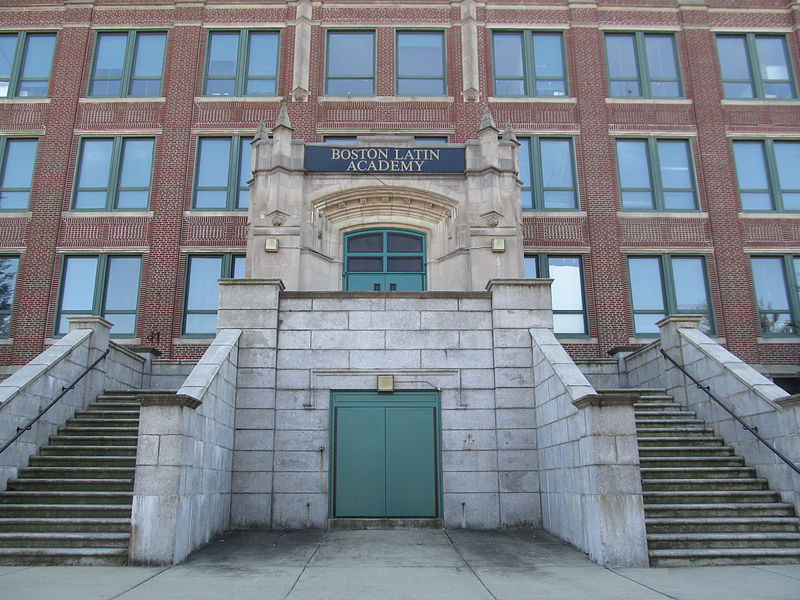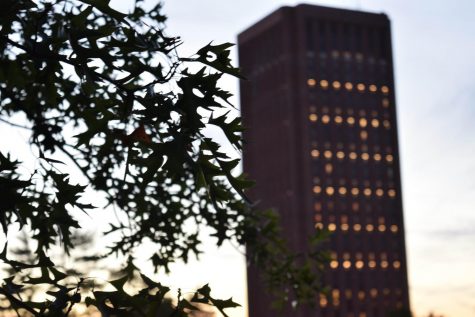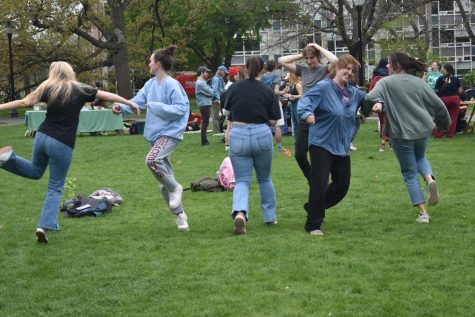One-third of Boston Student Advisory Council resigns in “student mutiny,” alleges abuse of power
The exodus followed this weeks revelation of a potentially invasive mental health practice and other claims of abusive behavior
Upwards of ten student representatives announced their resignations from the Boston Student Advisory Council (BSAC) last night calling for several firings and charging the council’s adult leadership with abuse of power. The protest-resignations account for a third of BSAC’s student membership and target administrators installed by Boston Public Schools and donor organization Youth on Board.
Boston Latin Academy senior Khymani James also turned in his resignation from the Boston School Committee, ending his six-month tenure as the committee’s sole student representative. Student representatives are required to maintain their BSAC membership to serve, but James says the “adultist and racist structures at play in both institutions pushed [him] to turn in [his] resignation.”
“It’s a student mutiny, it’s a student coup,” he says. “The adults that were with us were never protecting us. If anything, they were harming us. And either you learn to work with kids, or we’re leaving.”
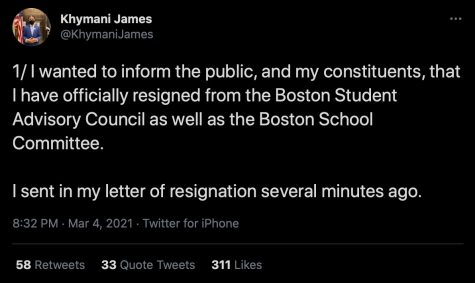
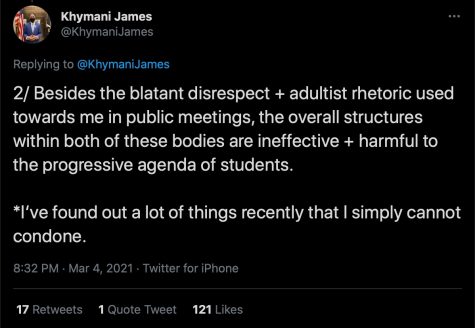
James notes BSAC always had a turbulent history maintaining student allegiance, but says this week’s devolution began Monday night when guest presenter and BPS Senior Director of Behavioral Health Services Andria Amador informed BSAC members of a decade-long, in-school initiative to document students’ mental health.
BSAC representatives say they were neither informed the program existed prior to this week nor were they aware the topic had been docketed for discussion. The resigning cohort says the scope of adult administrators’ control over the group’s weekly agenda threatens students’ agency on the council and adds that the lack of deference shown to student leaders only begins to capture the “coercion and manipulation” students say they have experienced.
“This past Monday was the perfect example as to why BSAC functions ineffectively,” said James in his departing remarks. “We had BPS personnel, white ones at that, who came into our space and presented a report admitting to invasive acts.”
“We weren’t aware of the program or the presentation on the program ahead of time, and when we tried to hold them accountable with our honest and blunt questions and concerns, we were shut down,” he said.
The program deployed in classrooms in 2010 has allowed teachers to observe and document markers of improving or worsening mental health in their pupils in lieu of mental health professionals, counselors or students themselves.
James says the optics of white teachers observing Black and Hispanic students and evaluating their mental health without their knowledge or consent is “incredibly fraught, deeply disturbing, and not even our biggest frustration, only the final straw.” The Massachusetts Department of Elementary and Secondary Education reports BPS serves a student population that is 29.3% African American, 42.4% Hispanic and only 15.3% White. Meanwhile, more than half of full-time BPS staff identify as Caucasian.
“We’re here to probe all the way to the truth of the matter. We’re here to install structural change. We’re here to be progressive and radical– or at least we were. Now, it is necessary for us to leave,” says James.
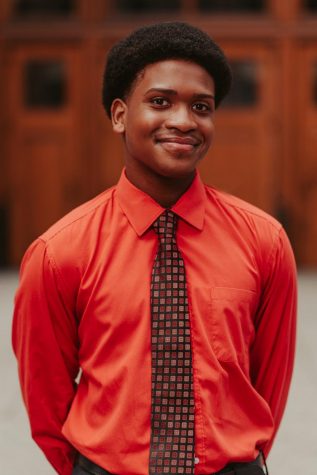
Ajanee Igharo, a junior at BLA and James’s former legislative director, says the grievances levied against adult administrators are not new and alleges a culture of routine dismissal prevails at BSAC.
The council belongs to the State Student Advisory Council, a legislatively mandated body in Massachusetts consisting of regional student advisory councils. Regional councils elect members to the SSAC, which in turn elects a chair to serve as a full voting member of the MA Board of Education.
BSAC hosts outside presenters during its Monday meetings holds Reevaluating Counseling meetings on Wednesdays and, on Thursday evenings, it breaks out into subcommittees. James says last night’s meeting was the first to near full attendance since he joined the group in January.
With more than 35 BSAC members present, student leader Danyael Morales introduced a motion to hear from the group’s adult Youth on Board administrators.
James says administrators Jenny Sazama and Maria Estrada, both on the call alongside their respective supervisors, refused to answer to the motion. Morales then introduced a motion to vote on whether to call on YOB to fire both co-administrators, a motion James says passed overwhelmingly.
The allegations against administrators allude to instances where Sazama wielded vulnerable details of students’ personal lives to retain their membership in BSAC and cooperation, as well as instances when students felt they were forced to cry during Reevaluating Counseling meetings, among others.
Igharo says late-night text messages from Sazama, a regular occurrence, are “intrusive” and amount to abuse. Reading aloud from a screenshotted text message conversation between Sazama and BSAC President Katio Barbosa, Igharo details an exchange where Sazama discusses stressors at work and at home with Barbosa before asking the 18-year-old to undertake additional unpaid work during “off program hours.”
Barbosa has not announced his intention to resign from BSAC, but Igharo says “there is no demand for everyone to leave. In fact, while it’s important for us to leave, it’s also important for people to stay, to reform the system from the inside out as long as administrators will listen.”
“People don’t always know when they’re being abused, but they know how it makes them feel,” she says. “It makes people uncomfortable and it’s painful to leave, but we aren’t asking for student voice simply, we’re asking for student power.”
Charlene Adames-Pimentel, also a former BLA representative resigning from BSAC, agrees the structure of the council fell into disrepair long before this week. “BSAC is broken, it doesn’t work for us anymore,” she says.
An example: the city’s website specifies each BPS high school should elect two representatives to BSAC. BPS comprises 33 high schools, James’s description of Thursday’s “full house” translates to just over 35 members and, so far, I’ve spoken to at least three student representatives from Boston Latin Academy alone.
Adames-Pimentel also says the city and Youth on Board’s responsibility to include BSAC representatives on their payroll contributes to an added layer of “intimidation, only it’s financial intimidation. It leads students to feel devalued for their work.”
“Disappointing actions either come in the form of silence on the issues, a lack of political will, or staff actively interrupting students doing their jobs,” says Adames-Pimentel.
Towards the end of our Zoom call, Adames-Pimentel types in the chat “I just told my mom everything.”
“Girl, she’s shook,” her message reads. At the end of the day, BSAC representatives are still students, teenage students who’ve felt their voices stifled in an environment where they were meant to be valued.
James is headed to Columbia in the fall– his final act as a student representative on the school committee was proposing a resolution to oppose administering the MCAS, or Massachusetts Comprehensive Assessment System.
A recording of the February 24th school committee meeting shows Chairperson Alexandra Oliver-Davila responding to James’s suggestion saying she would “venture to find out what [a resolution] would do.” She adds that “this committee doesn’t need to pass a resolution,” urging members to rely on the Superintendent’s office to negotiate with DESE about standardized testing.
James took to Twitter to question the “contradiction,” and he says his last memory of his time spent on the school committee “will always be one of being shot down.”
“The gag is that, if one of my adult peers on the committee were to have asked that question about the resolution in opposition to MCAS, they wouldn’t have gotten the same response. And they definitely wouldn’t have gotten blank stares,” says James.
“I don’t want to pretend to be listened to and neither does any BPS student I know.”
Boston City-Councilor-At-Large and mayoral candidate Michelle Wu expressed her support for BSAC resignees in a tweet Friday afternoon, saying she “[stands] with student leaders who have stepped down” and thanking them for “putting themselves on the line to fight for a better system.” Wu is the first public figure to do so.
Email Rebeca at rspereira@umass.edu or follow her on Twitter @RebecaPereiraa

